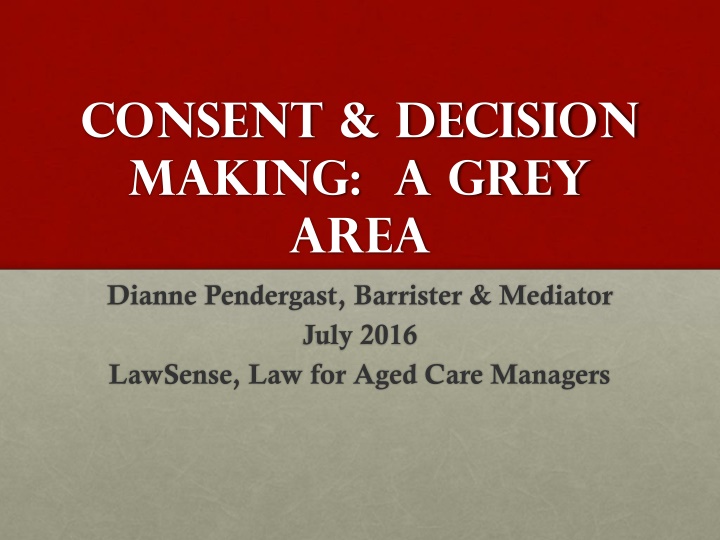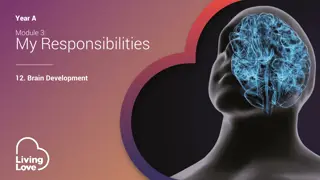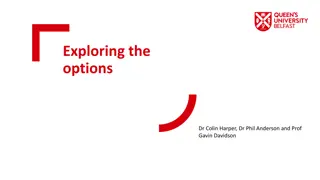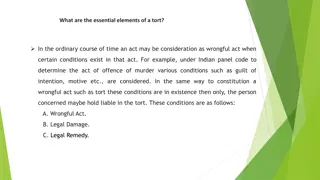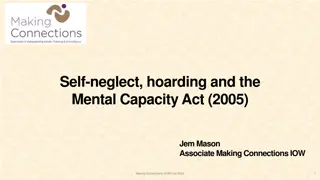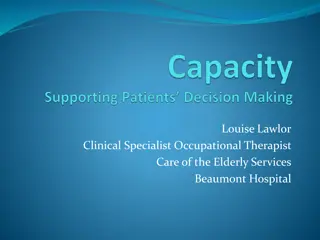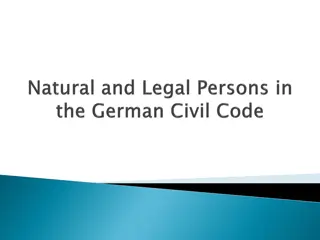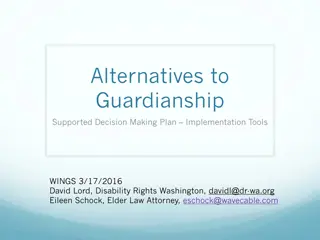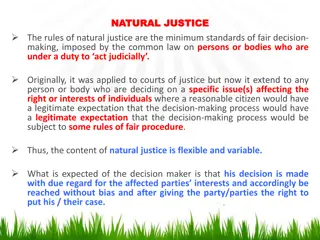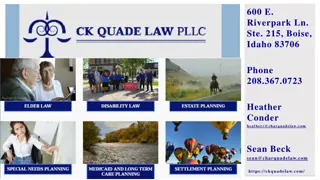Legal Elements of Decision-Making Capacity
Legal elements necessary for decision-making capacity including understanding, limits, consent, and episodic capacity assessment. Discusses when consent is required, guardianship legislation, and Tribunal expectations. Clarifies the nature and effect of decisions, voluntary decision-making, and communication requirements. Highlights the significance of domain-specific episodic capacity and the definition of consent in Australian law.
Download Presentation

Please find below an Image/Link to download the presentation.
The content on the website is provided AS IS for your information and personal use only. It may not be sold, licensed, or shared on other websites without obtaining consent from the author.If you encounter any issues during the download, it is possible that the publisher has removed the file from their server.
You are allowed to download the files provided on this website for personal or commercial use, subject to the condition that they are used lawfully. All files are the property of their respective owners.
The content on the website is provided AS IS for your information and personal use only. It may not be sold, licensed, or shared on other websites without obtaining consent from the author.
E N D
Presentation Transcript
Consent & decision making: a grey area Dianne Pendergast, Barrister & Mediator July 2016 LawSense, Law for Aged Care Managers
What we will talk about Legal elements required for decision making capacity. Assessing the limits of decision making capacity is there capacity for some decisions, but not others? Episodic capacity: how should this be assessed and managed? Understanding when consent is required, what constitutes consent and when it can be assumed. Reviewing circumstances where guardianship is required and the applicable legislation. Understanding the requirements & expectations of the Tribunal in making of guardianship applications
Legal elements decision making capacity Three elements - Understand the nature and effect of the decision. Freely & voluntarily able to make decisions. Communicate decisions. If not satisfy one of elements may lack decision making capacity.
The limits of decision making capacity Short answer, yes, there are limits. Cannot give consent to illegal activity eg murder. Law recognises different domains of decision making Financial (administration) Personal (guardianship) Where someone lives. Who they have contact with. Whether they hold a license. What services they receive. Legal matters List incomplete any personal decision an adult can make Health care including end of life decision making
Episodic capacity assessed & managed Capacity is domain specific & time specific. Golden rule: The law presumes that everyone has capacity to make full range of decisions unless proven others. Informal decision makers have the same decision making capacity as formal decision makers. For less significant decisions work with adult & informal decision makers to make decisions. Decisions with significant ramifications require formal decision makers protection for the adult (dignity) and protection for you.
What is consent Australian Law Reform Commission Different definitions different states. Consent is an act of reason & deliberation. Recommends one definition free and voluntarily agreement Detail is in the words. Cannot consent if lack capacity (eg dementia), use of force/threats of harm, unlawful detention, mistaken identity or mistake about the nature of the act, intimidation or coercive conduct.
WHEN IS CONSENT REQUIRED Medical treatment except in case of emergency where adult unable to give consent & no advanced decision eg advance health directive. Alter legal position. Contracts Engaging professional services. Engaging services. Decide where to live and who to spend time with. Any significant decision that has important consequences for the adult. Always dangerous to assume consent.
The more important the decision the more formal the process of consent Most formal process - informed consent Told risks and benefits. Risks and benefits of other options. Chance to ask questions and have them answered to your satisfaction. Have time to discuss with family/friends. You use the information to make the decision you think is in your best interests. You share your decision with others. Often involves signing document/s. Least formal little/no process - assent agree or concur with a statement.
Guardianship/ administration Required for Adult (18yo on) Lacks capacity (go back to earlier slide understanding, freely/voluntarily, and communicate). Need decision/s to be made. No decision maker (eg enduring power of attorney or advance health directive) or decision maker insufficient or dispute among decision makers (family dispute). Applicable legislation Guardianship & Administration Act 2000 Queensland Civil and Administrative Tribunal Act 2009
TRIBUNAL EXPECTATIONS Documents application & supporting medical evidence. Attendance - Adult & all important people in adults life be available to tribunal for a hearing about the application. For professional witnesses eg nurses it is appropriate to attend by telephone. Focus on adult giving the adult the best life that they can have with the least restrictions possible in a familiar environment that supports existing relationships.
Questions Thank you
